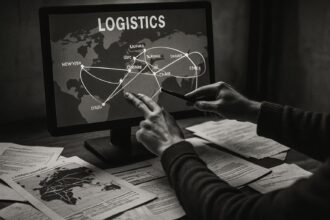The deadly journey to the Canary Islands has claimed thousands of lives, with new influxes from South Asia exposing migrants like Amir Ali and Imran Iqbal to brutal conditions and violence orchestrated by sophisticated smuggling networks.
The harrowing journey of Amir Ali and Imran Iqbal, Pakistani migrants in search of a better life in Europe, underscores the growing peril faced by individuals traversing the deadly maritime routes to the Canary Islands. Ali, just 21, found himself aboard a dangerously overcrowded boat in January, a far cry from the promise of a new beginning in Spain he had been sold by smugglers for a staggering $17,000. Instead, he was thrust into a nightmarish ordeal where survival grew increasingly tenuous amid tumultuous conditions and rampant violence.
Their venture had commenced far from the Atlantic, starting in Pakistan, where Ali, desperately seeking an escape, made an initial payment before embarking on a convoluted path that led through Ethiopia and Senegal to Mauritania. Along the way, he and others were trapped in cramped conditions, deprived of basic human needs, and coerced into paying more sums to their captors. Iqbal described his experience there as one of “captivity,” where not only their freedom but also their dignity was stripped away.
The violent capsizing of their vessel, which was meant to carry only 40 passengers yet was filled with over 85, resulted in a tragic death toll of 44 fellow migrants. This incident in January highlighted not just the immediate dangers involved but also the wider implications of an increasingly sophisticated network of smugglers exploiting desperate aspirations. The fate of Ali and Iqbal is but one thread in a broader tapestry of human suffering that reflects the harsh realities of migration, especially as the route to the Canary Islands is regarded as the world’s deadliest.
While the total number of migrants crossing to the Canary Islands has fluctuated, there has been a noticeable shift since 2020, with data from the Spanish Interior Ministry indicating that nearly 47,000 arrivals were recorded in 2024 alone. This represents a worrying increase from previous years, drawing migrants not only from West Africa but now increasingly from South Asia and the Middle East, destinations long thought dominated by more traditional Mediterranean routes.
Compounding the tragedy is the reality that these perilous journeys often end in death. Official statistics reveal that the International Organization for Migration recorded over 1,142 deaths last year alone, which is widely considered an underestimation. Non-governmental organisations, such as the Spanish rights group Walking Borders, have reported significantly higher figures, suggesting nearly 10,000 fatalities linked to the Canary Islands route, cementing its grim reputation as a graveyard for hopes and dreams.
Despite the mounting fatalities, the smuggling networks continue to adapt. Corruption among local officials has facilitated these dangerous migrations, while those in Pakistan reportedly eager to finance a better future remain oblivious to the dark realities of the migration business. Pakistani authorities, in response to public outcry, have initiated crackdowns on trafficking, arresting numerous low-level operatives. However, the sheer scale and flexibility of these operations mean that significant headway remains elusive.
The condition of migrants frequently worsens after departure, with instances of violence and deprivation reported widely. Survivors recount harrowing experiences upon overcrowded boats where dehydration and malnourishment threaten their lives. Tensions climb when desperate individuals turn on one another, and in Ali and Iqbal’s case, the nightmarish reality culminated in violence perpetrated by crew members, resulting in untold suffering.
Navigating the aftermath of such journeys, Ali reflects on the stark disparities back home, noting the lavish lifestyles of those who succeed in their attempts to migrate, leaving countless others, like him, disillusioned. “People like me see them and dream without thinking,” he said, and yet, after his perilous experience, the siren calls of escape have been fundamentally altered, replaced now by a profound awareness of the human cost.
Pakistani President Asif Ali Zardari has publicly vowed to combat the smuggling networks after the tragedy, recognising the need for a more robust intervention. However, the enduring challenge remains: how to dismantle these well-entrenched networks that perpetuate such loss of life while also addressing the dire socio-economic conditions that drive individuals to risk it all for a shot at a new life.
The plight of migrants is a sobering reminder of the complexities surrounding global movement; it highlights the interplay of desperation, ambition, and the often invisible structures that exploit human vulnerability. As maritime tragedies continue to make headlines, the call for actionable solutions grows louder, but with each passing day, the ocean swallows another dream.
 Reference Map:
Reference Map:
Source: Noah Wire Services
- https://www.independent.co.uk/news/spain-pakistan-europe-asif-ali-zardari-canary-islands-b2765568.html – Please view link – unable to able to access data
- https://apnews.com/article/ef38de1e7a7956cf4ed5f248e3eb97d8 – This article details the perilous journey of Pakistani migrants attempting to reach Europe via increasingly dangerous smuggling routes. Amir Ali and Imran Iqbal, among other migrants, paid thousands of dollars to traffickers promising safe passage, only to face abuse, starvation, and captivity during their months-long ordeal through Ethiopia, Senegal, and Mauritania. In January, they embarked on an overcrowded fishing boat aiming for Spain’s Canary Islands. The 10-day voyage turned deadly: 44 Pakistanis died, mostly from violence or harsh conditions, with only 12 bodies recovered. The Atlantic route, now considered the deadliest for migrants, has become more frequented by individuals from South Asia and the Middle East due to tighter Mediterranean controls. Smugglers, often aided by corrupt officials, constantly adapt to enforcement measures. Pakistani authorities have since launched crackdowns, though targeting low-level operatives has had limited effect. Survivors like Ali return home disillusioned, their dreams starkly at odds with the grim reality of migrant life. The story underscores the human cost of global migration pressures and the expansion of transnational smuggling networks.
- https://apnews.com/article/6a458e7b92176a127f8b80156f593848 – This report covers a tragic incident where at least 16 Pakistanis drowned, and 10 are missing after a migrant boat sank off Libya’s coast, with 33 survivors currently in Libyan police custody and one hospitalized. 65 individuals were on board, aiming to reach Europe. Prime Minister Shehbaz Sharif expressed sorrow for the victims from northwestern Khyber Pakhtunkhwa and mandated the Foreign Ministry to identify the deceased and assist the affected. He also demanded action against human traffickers. This tragedy follows another incident in January, where dozens of Pakistanis died in a similar boat capsize near West Africa. Libya remains a critical transit point for migrants escaping poverty and conflict, with hundreds perishing yearly on dangerous journeys to Europe. In 2024, 674 migrants died, and over 1,000 were missing off Libya. Human rights abuses in Libyan detention centers are rampant, with forced labor, torture, and extortion from migrants’ families being common.
- https://www.reuters.com/world/europe/spains-canaries-rescuers-exhausted-new-migrant-routes-open-2024-11-21/ – El Hierro, part of Spain’s Canary Islands, is facing an overwhelming influx of migrants, many times exceeding its local population of 11,400. By mid-November 2024, roughly 19,400 migrants, mostly from Mali, Senegal, and Morocco, have landed, straining local resources. The Nuestra Señora de los Reyes hospital, designed for the island’s residents, now shelters numerous migrants suffering from hypothermia and dehydration. With a sharp rise in arrivals by sea, the Canary Islands have become a crucial entry point for migrants heading to Europe. Most migrants embark from West Africa, traversing perilous routes across the Atlantic. Efforts by Spain to curb migration through agreements with African nations have had mixed results. The Canaries face significant challenges, especially with the increasing number of unaccompanied minors, placing pressure on shelters and schools. Spain has been working on bolstering border controls and deportations but faces hurdles due to the lack of deportation agreements with key African countries. The situation underscores the complexities and human costs of the global migration crisis.
- https://apnews.com/article/29d58ccf4ffdcde2860bbbce948c7ff0 – More than 40 Pakistanis are feared drowned after a migrant boat capsized off the coast of West Africa. The incident occurred near the Moroccan-controlled port city of Dakhla in the disputed Western Sahara. President Asif Ali Zardari and Prime Minister Shehbaz Sharif expressed their sorrow over the tragedy and emphasized the need for stricter measures to curb human trafficking. The boat, which carried 80 passengers including Pakistanis, set off from Mauritania but began its journey on January 2. Nearly all Pakistani victims hailed from Punjab province. Families of the deceased and survivors are seeking assistance from the government for repatriation and tracing missing relatives. The high-risk routes to Europe have seen increased fatalities, with more dangerous paths being used after increased security measures in the Mediterranean. Last year, over 50,000 migrants made the journey from northwest Africa to Spain’s Canary Islands, with a significant number of deaths reported on this route. Pakistan is working with Moroccan authorities to assist survivors, and has vowed to intensify efforts against human trafficking.
- https://www.reuters.com/world/dozens-migrants-may-have-drowned-en-route-spain-by-boat-ngo-says-2025-01-16/ – As many as 50 migrants attempting to reach Spain from West Africa may have drowned, according to the NGO Walking Borders. Moroccan authorities rescued 36 people from a boat that departed Mauritania on January 2 carrying 86 migrants, including 66 Pakistanis. Walking Borders reported that in 2024, a record 10,457 migrants died trying to reach Spain, predominantly via the Atlantic route from Mauritania and Senegal to the Canary Islands. The NGO had alerted relevant authorities six days earlier about the missing boat. Alarm Phone, an NGO providing emergency support for migrants at sea, informed Spain’s maritime rescue service on January 12, but the service had no information about the boat. Following Walking Borders’ social media post, Canary Islands’ regional leader Fernando Clavijo emphasized the need for Spain and Europe to take action to prevent migrant deaths, expressing sorrow for the victims. Walking Borders CEO Helena Maleno noted that 44 of the victims were from Pakistan, enduring 13 days at sea without rescue.
- https://www.aa.com.tr/en/europe/249-irregular-migrants-arrive-on-spains-canary-islands/3318009 – A total of 249 irregular migrants, including Pakistanis and Syrians, arrived on Spain’s Canary Islands, according to Spanish news agency EFE. EFE, citing security and emergency teams, reported that 174 migrants, including women and children, landed on the island of El Hierro, while 75 others arrived in Gran Canaria on two separate boats. Among those arriving in El Hierro, 51 were identified as Pakistani and Syrian nationals, who used an unusual route as migrants from these countries are typically known to use the Mediterranean, authorities said. The number of irregular migrants arriving in Spain has surged by nearly 70% in the first eight months of 2024 compared to the same period last year, with 22,304 arrivals recorded on the Canary Islands alone. Recently, Spanish Prime Minister Pedro Sanchez traveled to Senegal, Gambia and Mauritania to discuss the irregular migrant issue.
Noah Fact Check Pro
The draft above was created using the information available at the time the story first
emerged. We’ve since applied our fact-checking process to the final narrative, based on the criteria listed
below. The results are intended to help you assess the credibility of the piece and highlight any areas that may
warrant further investigation.
Freshness check
Score:
8
Notes:
The narrative presents recent events, with the earliest known publication date of similar content being January 16, 2025. ([reuters.com](https://www.reuters.com/world/dozens-migrants-may-have-drowned-en-route-spain-by-boat-ngo-says-2025-01-16/?utm_source=openai)) The report includes updated data, such as the number of migrant arrivals in 2024, which may justify a higher freshness score. ([canarianweekly.com](https://www.canarianweekly.com/posts/Migrant-arrivals-in-the-Canary-Islands-have-dropped-by-40-so-far-in-2025?utm_source=openai))
Quotes check
Score:
7
Notes:
Direct quotes from Amir Ali and Imran Iqbal are not found in earlier material, suggesting potential originality. However, similar narratives have been reported, indicating possible reuse of content. ([apnews.com](https://apnews.com/article/ef38de1e7a7956cf4ed5f248e3eb97d8?utm_source=openai))
Source reliability
Score:
9
Notes:
The narrative originates from The Independent, a reputable UK-based news organisation, lending credibility to the report.
Plausability check
Score:
8
Notes:
The claims align with known patterns of migration routes and smuggling activities. The involvement of Pakistani President Asif Ali Zardari in addressing the issue is consistent with his public statements. ([euronews.com](https://www.euronews.com/2025/01/18/dozens-of-pakistani-migrants-feared-to-have-drowned-in-atlantic-ocean?utm_source=openai))
Overall assessment
Verdict (FAIL, OPEN, PASS): PASS
Confidence (LOW, MEDIUM, HIGH): HIGH
Summary:
The narrative presents a timely and plausible account of the challenges faced by Pakistani migrants en route to the Canary Islands. While some elements may have been reported elsewhere, the inclusion of updated data and direct quotes suggests a high degree of originality. The involvement of a reputable news organisation and consistent reporting across multiple sources further supports the credibility of the report.













